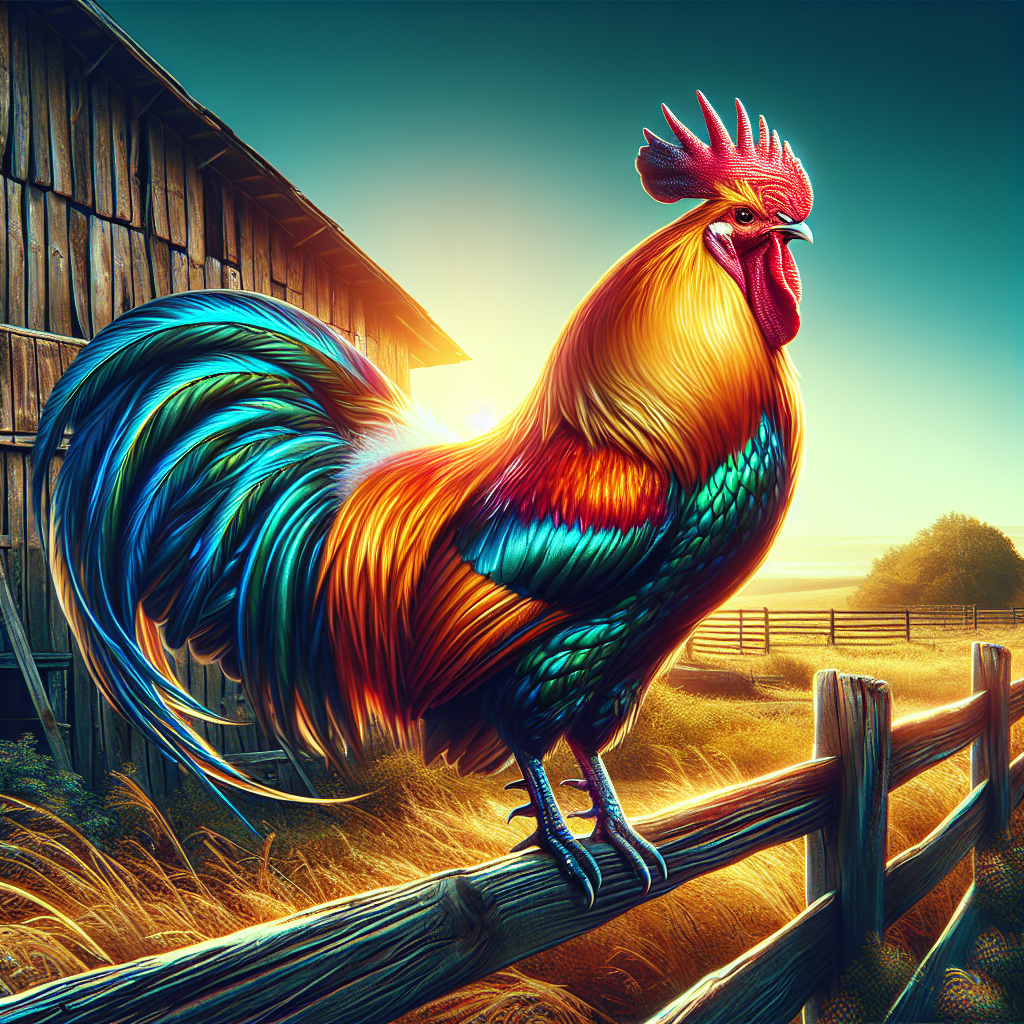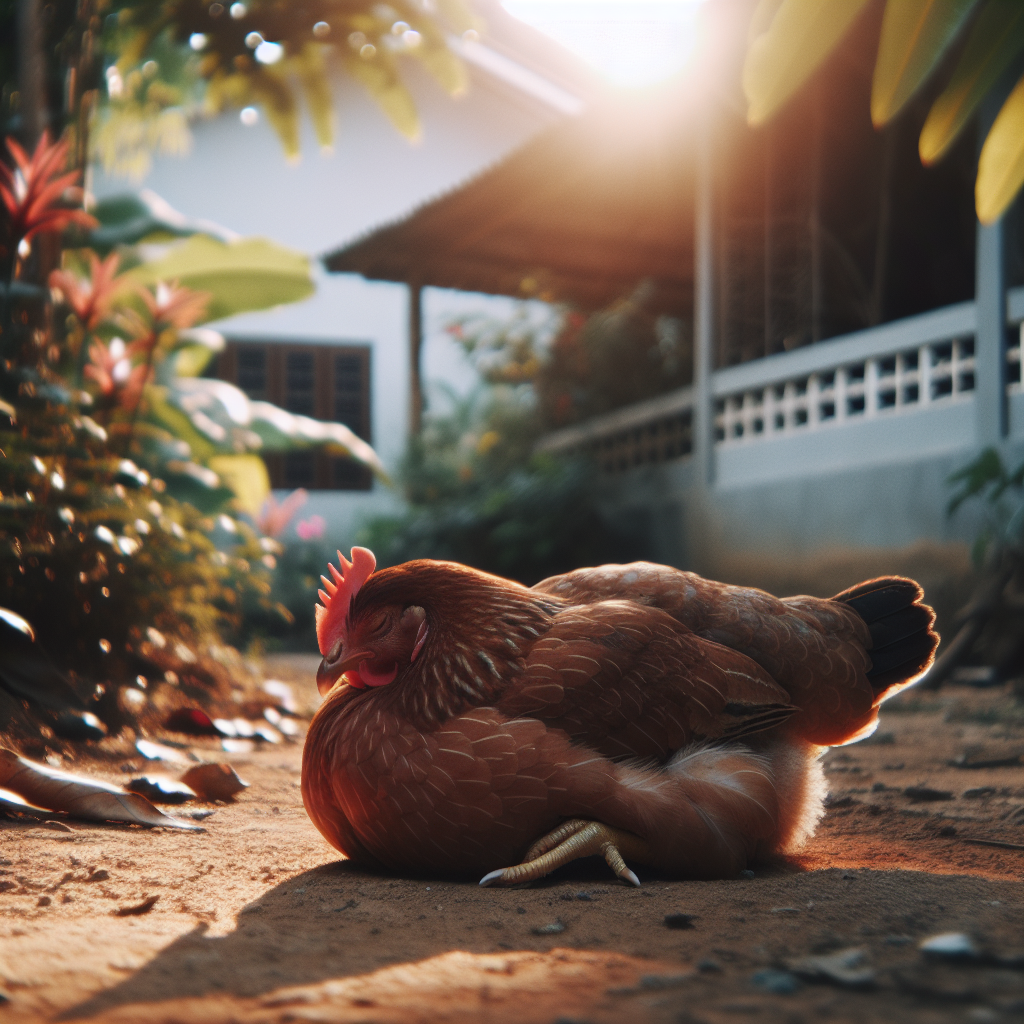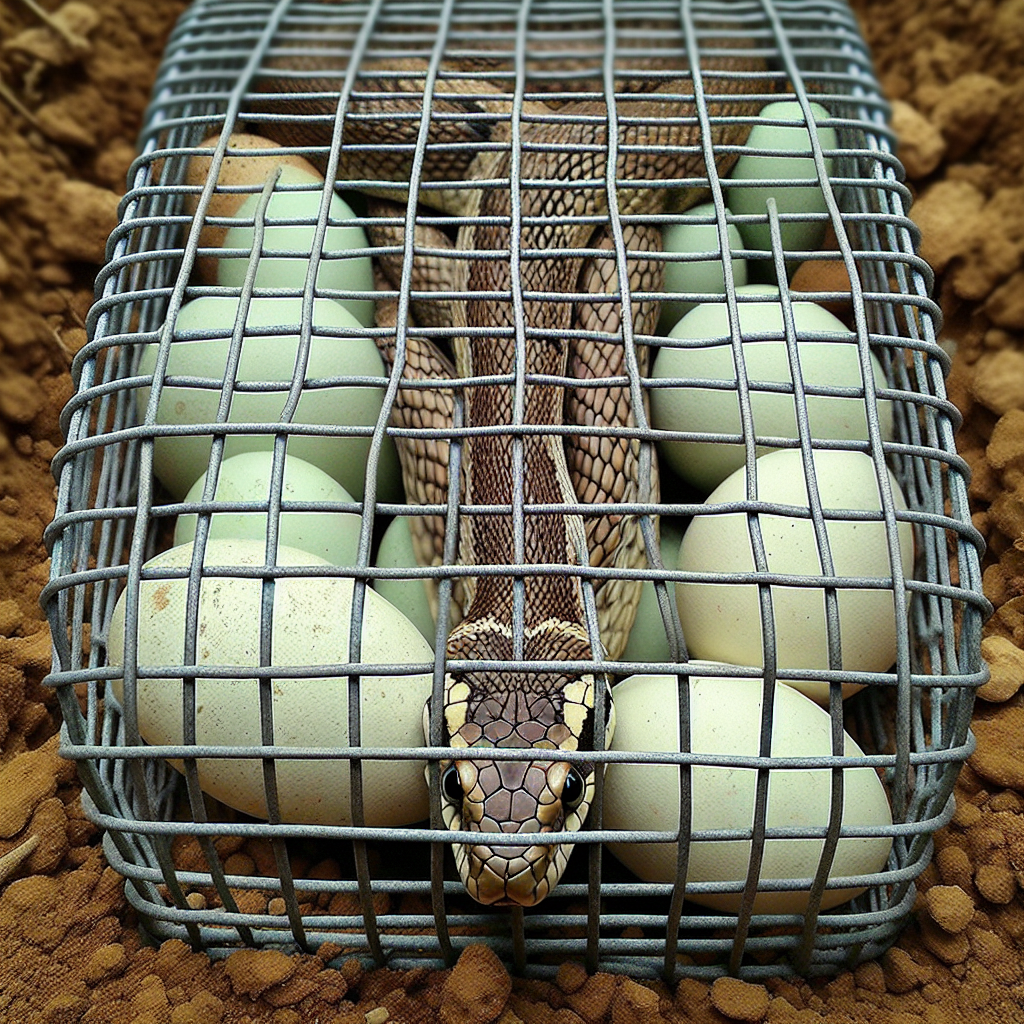Have you ever wondered how keeping a rooster can enhance predator protection in your backyard? Well, it turns out that having a rooster as part of your flock can provide numerous advantages when it comes to safeguarding your chickens from potential predators. From their keen senses and constant vigilance to their ability to alert the flock of any impending danger, roosters play a vital role in keeping the entire flock safe and secure. So, if you’re looking to add an extra layer of protection to your feathered friends, a rooster may just be what you need.
Understanding Predator Protection
Poultry owners are well aware of the constant threat posed by predators. From foxes and raccoons to hawks and coyotes, these creatures see your poultry as a potential meal. As a poultry owner, it is crucial to prioritize predator protection to ensure the safety and well-being of your flock.
Importance of Predator Protection for Poultry Owners
Predator protection is of utmost importance for poultry owners due to the vulnerability of their flock. Without effective measures in place, predators can easily invade your coop and harm or kill your chickens. The loss of valuable birds not only affects the livelihood of poultry owners but also disrupts the natural balance within the flock. By implementing predator protection strategies, you can safeguard the lives of your feathered friends and maintain a thriving poultry operation.
Role of a Rooster in Predator Protection
When it comes to predator protection, a rooster plays a vital role in keeping your flock safe. These majestic creatures come equipped with natural instincts that make them excellent guardians for your hens. Let’s explore some key aspects of a rooster’s role in predator protection.
Explanation of a Rooster’s Natural Instincts
Roosters, as the leaders of the flock, are instinctively wired to protect their hens from potential threats. This nesting instinct, deeply embedded in their DNA, drives them to maintain a vigilant watch over their flock, ensuring their safety at all times. With their sharp vision and acute hearing, roosters are always on high alert, ready to respond to any signs of danger.
Alerting the Flock to Potential Threats
One of the most critical roles a rooster plays in predator protection is alerting the flock to potential threats. Roosters have a unique ability to recognize signs of danger before they become imminent. With a shrill and distinct crow, they can effectively communicate the presence of a lurking predator to the entire flock, allowing the hens to seek cover and safety.
Deterrence Through Crowing and Aggressive Behavior
Roosters also serve as a deterrent to predators through their crowing and aggressive behavior. The loud and unmistakable sound of a rooster’s crow serves as a warning to predators that their presence has been detected. This can often be enough to intimidate smaller predators and deter them from approaching your coop. Additionally, roosters are not afraid to confront intruders head-on, displaying aggressive posturing and territorial behavior to safeguard their flock.
Leadership and Protective Behavior Towards Hens
A rooster’s leadership qualities shine through in their protective behavior towards the hens. Roosters take it upon themselves to shield their hens from any potential harm. They will position themselves between the predator and the hens, ready to engage in a confrontation if necessary. This instinctual behavior showcases their dedication and commitment to safeguarding the well-being of their flock.
Influence on Predator Hierarchy
Roosters have a remarkable ability to establish dominance within the predator hierarchy. By challenging other predators and displaying their strength and fierceness, roosters send a clear message that your flock is protected. This can reduce the likelihood of predator attacks, as they understand the potential consequences of encroaching on the rooster’s territory. With a rooster in charge, your chickens will enjoy a safer environment, free from constant predator threats.
1. Enhanced Awareness
Rooster’s Heightened Senses
Roosters possess exceptional sensory abilities that contribute to their role in predator protection. Their keen eyesight allows them to detect even the slightest movements in the surrounding area. Coupled with their acute hearing, roosters can be highly effective in sensing the presence of predators lurking nearby.
Perimeter Patrolling
Chief among a rooster’s responsibilities is the task of perimeter patrolling. These diligent guardians will frequently patrol the perimeter of the coop and the surrounding area to ensure there are no signs of potential dangers. This constant vigilance helps them identify any potential threats and react swiftly to protect their flock.
Early Detection of Predators
Thanks to their enhanced senses and diligent patrolling, roosters are often the first to detect predators approaching. Their ability to detect danger early allows them to sound the alarm and take appropriate action, ensuring the safety of the entire flock. The early detection of predators gives you a crucial head start in implementing necessary predator protection measures.
2. Alarm System for the Flock
Crowing as an Alarm Signal
A rooster’s crow serves as a natural alarm signal for the entire flock. With its distinctive sound, the crowing of a rooster immediately alerts the hens and other chickens of potential danger. This loud and penetrating call acts as an immediate warning, urging the flock to seek cover and stay vigilant.
Differentiating Between Normal and Danger Crowing
Roosters possess the ability to differentiate between normal crowing and danger crowing. While they may crow throughout the day, certain changes in the pattern or intensity of their crow signify a potential threat. This keen sense of discernment allows them to communicate the severity of the danger to the rest of the flock.
Communication with Hens During Potential Threats
Roosters excel at communication, especially during potential threats. They have the remarkable ability to effectively convey the level of danger to their hens. Through a series of vocalizations and body language, they can guide their flock and ensure that all members are aware of the risks they face. This communication plays a crucial role in maintaining the collective safety of the flock.
3. Intimidating Presence
Aggressive Posturing Towards Predators
Roosters are not afraid to take on predators, and their aggressive posturing is one of the ways they protect their flock. They will puff up their feathers, extend their wings, and assume an imposing stance when confronted by potential threats. This display of strength and aggression serves to intimidate predators and discourage them from making any advances towards the flock.
Display of Dominance and Territorial Behavior
A rooster’s territorial behavior is another way they exert their influence and protect their hens. They will mark their territory by scratching the ground, leaving behind visual and olfactory cues that deter predators from encroaching on their domain. Their dominant behavior and territoriality make it clear to predators that their flock and territory are off-limits.
Warding off Smaller Predators
In addition to confronting larger predators, roosters also play a crucial role in warding off smaller predators. Their size, strength, and fearless attitude make them formidable opponents for creatures like raccoons, small mammals, and even snakes. By taking a stand against these smaller predators, roosters effectively protect their hens from potential harm.
Raising the Flock’s Confidence
A rooster’s presence and protective behavior not only keep predators at bay but also instill a sense of confidence in the entire flock. The hens feel secure under the watchful eye of their rooster and are more likely to roam freely and engage in natural behaviors. This increased confidence leads to healthier and happier chickens overall.
4. Protective Behavior
Shielding Hens from Predators
When confronted with a potential threat, roosters position themselves between the predator and the hens, using their bodies as shields. This selfless act of protection ensures that the hens are kept safe from harm. Roosters are fully committed to sacrificing themselves if it means safeguarding the lives of their hens.
Defending the Flock During Confrontations
If a confrontation with a predator ensues, a rooster will use its sharp beak and strong claws to defend the flock. They will engage in fierce battles, displaying their strength and agility to ward off the predator. Roosters are not afraid to fight tooth and nail to protect their flock, even if it means putting their own lives on the line.
Assessing Threat Levels and Responding Accordingly
Roosters possess the ability to assess the level of threat posed by predators. They can distinguish between minor threats that can be handled by a show of force and more severe threats that require immediate action. This ability to evaluate the situation and respond accordingly contributes to their effectiveness in protecting the flock.
5. Influence on Predator Hierarchy
Establishing Dominance in the Area
Roosters establish dominance not only within their flock but also within the predator hierarchy. By displaying their strength and challenging other predators, roosters stake their claim to their territory. This dominance sends a clear message to potential predators that encroaching on their territory will not be tolerated, reducing the likelihood of predator attacks on the flock.
Challenging Other Predators
Roosters are not afraid to take on predators other than their own kind. Whether it’s challenging a fox, a hawk, or even a coyote, roosters will fearlessly confront these threats head-on. Their courage and tenacity make them formidable opponents for predators, often deterring them from targeting your flock.
Reducing Likelihood of Predator Attacks
A rooster’s influential role in the predator hierarchy significantly reduces the likelihood of predator attacks on your flock. Predators understand the risks associated with a direct confrontation with a rooster and are more likely to seek easier prey elsewhere. This reduction in the risk of predator attacks contributes to creating a safer environment for your poultry.
Creating a Safer Environment for the Flock
Ultimately, a rooster’s influence on the predator hierarchy translates into a safer environment for your flock. With the presence of a dominant rooster, the risk of predator attacks decreases significantly. Your chickens can roam and forage freely, knowing that they have a strong and capable protector watching over them.
6. Deterring Nocturnal Predators
Rooster’s Vigilance at Night
While a rooster’s protective duties are not limited to daylight hours, they are particularly vigilant during the night when nocturnal predators pose a significant threat. Roosters maintain a watchful eye, keeping a close lookout for any signs of danger, even in the darkness. Their heightened senses and intuitive nature make them ideal guardians during the vulnerable hours of sleep.
Scaring Away Nocturnal Predators
Roosters possess the ability to scare away nocturnal predators through their presence alone. The territorial display, aggressive posturing, and loud crowing of a rooster can startle and deter predators from approaching. This intimidation factor is often enough to convince nocturnal predators to seek an easier meal elsewhere, ensuring the safety of your flock during the night.
Protection During Vulnerable Sleep
By keeping a rooster in your flock, you provide an added layer of protection for your chickens during their vulnerable sleep. Roosters are constantly alert and have been known to engage in periodic crowing throughout the night to keep predators at bay. This watchful nature ensures that your hens can rest peacefully without the constant fear of nocturnal predators.
7. Additional Protection with Vocalizations
Alarm Calls to Rally the Flock
Roosters possess a set of vocalizations that they use to communicate with their flock during potential threats. This includes alarm calls that serve to rally the flock together, ensuring that all chickens are aware of the impending danger. These alarm calls act as a unifying force, allowing the flock to come together and take necessary measures to protect themselves.
Warning Calls to Signal Danger
Along with alarm calls, roosters also use warning calls to signal the presence of danger. These distinct vocalizations carry a sense of urgency, urging the flock to take immediate action. The ability of roosters to effectively communicate danger through their vocalizations contributes to the overall safety and well-being of the flock.
Communication with Other Chickens for Collective Safety
Roosters not only communicate with their hens but also with other chickens within the flock. Through a series of vocalizations and body language, roosters establish a line of communication that enhances the collective safety of all chickens. By keeping the entire flock informed and coordinated, roosters contribute to the overall effectiveness of predator protection strategies.
10. Natural Predator Deterrent
Rooster’s Presence as a Deterrent
The mere presence of a rooster in your flock acts as a natural deterrent to potential predators. Predators are less likely to approach an area that is clearly claimed by a rooster, as they understand the risks associated with a confrontation. By keeping a rooster, you establish a visual deterrent that helps prevent predator attacks before they even occur.
Preventing Predator Attacks Before They Occur
Roosters play an instrumental role in preventing predator attacks before they occur. Through their leadership, territoriality, and deterrent behavior, they effectively communicate to predators that the area is unsafe for hunting. This proactive approach helps ensure that your flock remains protected and minimizes the risk of repeated predator visits.
Reducing the Likelihood of Repeated Predator Visits
With a rooster actively guarding your flock, the likelihood of repeated predator visits decreases significantly. Predators quickly learn to associate the presence of a rooster with potential danger and will seek out easier prey elsewhere. This reduction in repeated predator visits allows your flock to focus on their natural behaviors without constant fear and disruption.
In conclusion, keeping a rooster provides significant benefits in terms of predator protection for your poultry. From their enhanced awareness and alarm system abilities to their intimidating presence and protective behavior, roosters serve as capable guardians for your flock. Their influence on the predator hierarchy and their role in deterring nocturnal predators ensure a safer environment for your chickens. Additionally, their vocalizations and natural deterrent qualities contribute to preventing predator attacks before they occur. By understanding the valuable role roosters play in predator protection, poultry owners can take proactive measures to safeguard their flock and enjoy peace of mind. So, consider welcoming a rooster to your flock and watch them fulfill their innate duty of protecting and caring for your hens.




